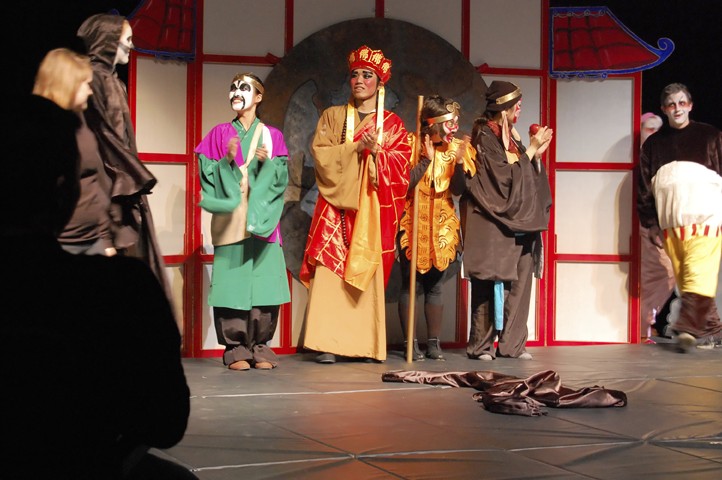Peking University, Mar. 8, 2011: Chinese and American students will be traveling between the two countries this month to perform an award-winning play.
This past weekend the Purdue Theatre department partnered up with Peking University (Beida) in China to perform Hu Xiaoqing's adaptation of “The Monkey King,” a story of a monk and his three servants traveling to discover the secret of the universe while trying to avoid being caught and eaten by an evil spirit.
“The Monkey King” is the first performance of its kind for the Purdue Theatre Department. Never before has the department put on a performance with students from a university in a different country acting and working alongside Purdue students.
The play was performed between March 3-5 at three different locations: Carole and Gordon Mallett Theatre, Glen Acres Elementary School and Edgelea Elementary School. In China, the play will be performed between March 15-20 at the Penghao Theater in Beijing. The Purdue student actors will travel to Beijing over spring break to perform there.
The Beida students, directed by Beida Institute of World Theatre and Film’s artistic director Joseph Graves, were cast as Master Tang and his three servants: the wily and powerful Monkey King, Sandy the mute fire-breather, and the constantly complaining Porky.

Actors file out for curtain call after their performance on Friday.
Meanwhile, the Purdue students, directed by head of Purdue’s acting program Kristine Holtvedt, acted out the roles of the evil Skeleton Spirit and her bumbling lackeys, the lantern demons.
Director of Purdue’s undergraduate theater studies Joel Ebarb, the project liaison and producer of the performance, presented the idea to Hong Wei, director of the Confucius Institute at Purdue, in April.
“The cooperation between the two countries is something I’m already happy about. It’s a good education for the audience and students here as well as for the Chinese students from Peking University,” said Hong. “Students are excited to go to China. Some of them are leaving the country for the first time. Every angle of the project meets the Confucius Institute’s mission.”
The Confucius Institute is the primary sponsor for the play. Without its funding, which included plane tickets for the students, the performance would not have been possible, Ebarb said.
The group from Beida arrived at Purdue on February 25 and got situated with the host families with whom they were going to live. The following day, at a kick-off reception, the Beida and Purdue casts met in person for the first time, but with their first performance only five days away there wasn’t much time to relax.
“It was odd at first. We couldn’t do blocking or staging. When we finally got together we had 16 hours of rehearsal to get everything ready,” said Graves. “We based the blocking loosely on how we set it up in Beida but we still had to change it.”
“I haven’t changed out of my costume in three weeks,” Noelle Turner-Ball, the actor that played one of the lantern demons, said jokingly.
But the students pulled through and came out of it with a performance that filled the theater with smiles and laughter.
“We saw a lot, ate at a lot of restaurants and the host families were very nice,” said Sebastian Li Shi, the Beida performer who played Master Tang. “We worked hard but it was a lot of fun.”
Reported by: Bane Srdjevic
Edited by: Chen Miaojuan
Source: Purdue Exponent